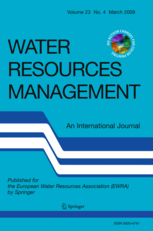June 4, 2012
Water, People, and Sustainability—A Systems Framework for Analyzing and Assessing Water Governance Regimes
Authors
Arnim Wiek (1) and Kelli L. Larson (1, 2)
Abstract
 Freshwater resources might become the most limited resource in the future due to rising demands, climate change, and the degradation of aquatic ecosystems. While the urgency of this challenge is uncontested, water governance regimes still struggle to employ suitable responses. They lack of: taking a comprehensive perspective on water systems; focusing on social actors, their actions, needs, intentions, and norms as drivers of water systems; engaging in a discourse on tangible goals to provide direction for governance efforts; and promoting a comprehensive perspective on water sustainability that equally recognizes depletion, justice, and livelihood issues in the long-term. We present an approach that intends to overcome these limitations by putting the focus on what people do with water, and why, along with the impacts of these doings. First, we outline an integrated approach to water governance regimes, and then, we present a holistic set of principles by which to evaluate sustainable water governance. Solution-oriented research applying this approach integrates natural sciences and engineering perspectives on water systems with social science studies on water governance, while also specifying and applying normative principles for water sustainability. The approach we develop herein can be used to reform and innovate existing water governance regimes as well as stimulate transformative governance research.
Freshwater resources might become the most limited resource in the future due to rising demands, climate change, and the degradation of aquatic ecosystems. While the urgency of this challenge is uncontested, water governance regimes still struggle to employ suitable responses. They lack of: taking a comprehensive perspective on water systems; focusing on social actors, their actions, needs, intentions, and norms as drivers of water systems; engaging in a discourse on tangible goals to provide direction for governance efforts; and promoting a comprehensive perspective on water sustainability that equally recognizes depletion, justice, and livelihood issues in the long-term. We present an approach that intends to overcome these limitations by putting the focus on what people do with water, and why, along with the impacts of these doings. First, we outline an integrated approach to water governance regimes, and then, we present a holistic set of principles by which to evaluate sustainable water governance. Solution-oriented research applying this approach integrates natural sciences and engineering perspectives on water systems with social science studies on water governance, while also specifying and applying normative principles for water sustainability. The approach we develop herein can be used to reform and innovate existing water governance regimes as well as stimulate transformative governance research.
Conclusions
Solution-oriented research on water sustainability ultimately intends to provide guidance on what stakeholder groups need to do differently. The ultimate goal is to transition to water governance regimes that better comply with sustainability principles: optimizing economic and social welfare in an equitable manner without compromising the viability and integrity of the supporting ecosystems in the long term. However, this question is a separate research stream, namely, on transition paths and interventions, which is often confounded with analytical (what is the current regime?) and normative questions (how sustainable is the current regime?) addressed in the present article. The present article focuses on the systemic understanding and evaluation of regional water governance regimes and prepares, but does not include, studies on how to realize transitions from current to sustainable governance regimes. Future research is needed to apply and further develop the approach with respect to its conceptual robustness (set of sustainability principles and assessment methodology) and its applicability in participatory and collaborative water modeling and other governance activities. Yet, with an integrated perspective on actors and activities, the approach in its present form provides initial guidelines for the redesign of water governance regimes towards sustainability.
Read the article here. Subscription may be required.
(1) School of Sustainability, ASU
(1) School of Sustainability, ASU and (2) School of Geographical Sciences and Urban Planning, ASU

